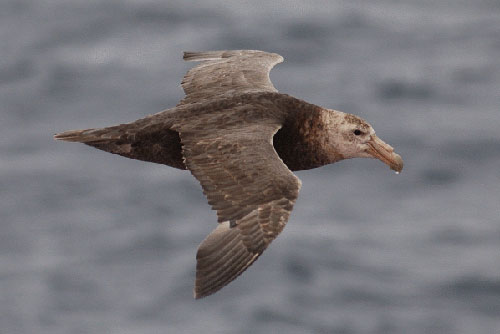
Southern Giant Petrel at sea, photograph by Warwick Barnes
Jarred Towers (Bay Cetology, Alert Bay, British Columbia, Canada) and Nicolas Gasco have published in the journal Polar Biology on giant petrels attacking Sperm Whales.
The abstract follows:
“Relationships between seabirds and cetaceans can vary from symbiotic to predatory. At high latitude seas in the Southern Hemisphere, giant petrels (Macronectes spp.) and male sperm whales (Physeter macrocephalus) are often solitary, but commercial longlining for Patagonian toothfish (Dissostichus eleginoides) provides consistent feeding opportunities that result in persistent aggregations of both. From ~ 1997 to 2019, we opportunistically photographed 23 events where individual giant petrels preyed on the flesh. of live sperm whales that were depredating from Patagonian toothfish longliners near South Georgia, Crozet, and Kerguelen Islands. Both immature and adult southern (M. giganteus) and northern (M. halli) giant petrels were implicated in these predation events. Sperm whales reacted to attacks from one or more giant petrels by sinking or flinching, and then arching, rolling, diving, and snorkelling at the surface during subsequent predation attempts. Depredating sperm whales will dive deep, fast, and for long periods which can result in limited dive ability while replenishing oxygen stores at the surface. This behaviour, and the relatively high density of both species around longlining vessels may facilitate unique opportunities for giant petrels to exploit live sperm whales that are not likely as common under circumstances not sustained by longlining operations.”
Reference:
Towers, J.R., Gasco, N. 2020. Giant petrels (Macronectes spp.) prey on depredating sperm whales (Physeter macrocephalus). Polar Biology doi.org/10.1007/s00300-020-02687-2.
John Cooper, ACAP Information Officer, 07 June 2020

 English
English  Français
Français  Español
Español